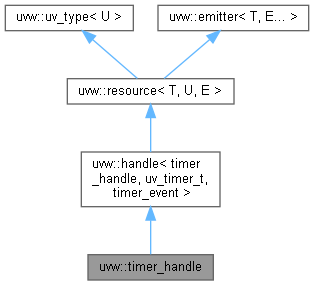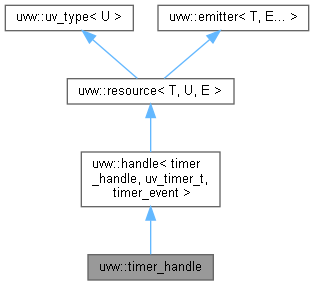The timer handle. More...
#include <timer.h>


Public Member Functions | |
| int | init () final |
| Initializes the handle. | |
| int | start (time timeout, time repeat) |
| Starts the timer. | |
| int | stop () |
| Stops the handle. | |
| int | again () |
| Stops the timer and restarts it if it was repeating. | |
| void | repeat (time repeat) |
| Sets the repeat interval value. | |
| time | repeat () |
| Gets the timer repeat value. | |
| time | due_in () |
| Gets the timer due value. | |
 Public Member Functions inherited from uvw::handle< timer_handle, uv_timer_t, timer_event > Public Member Functions inherited from uvw::handle< timer_handle, uv_timer_t, timer_event > | |
| handle_category | category () const noexcept |
| Gets the category of the handle. | |
| handle_type | type () const noexcept |
| Gets the type of the handle. | |
| bool | active () const noexcept |
| Checks if the handle is active. | |
| bool | closing () const noexcept |
| Checks if a handle is closing or closed. | |
| void | close () noexcept |
| Request handle to be closed. | |
| void | reference () noexcept |
| Reference the given handle. | |
| void | unreference () noexcept |
| Unreference the given handle. | |
| bool | referenced () const noexcept |
| Checks if the given handle referenced. | |
| std::size_t | size () const noexcept |
| Returns the size of the underlying handle type. | |
| int | send_buffer_size () |
| Gets the size of the send buffer used for the socket. | |
| int | send_buffer_size (int value) |
| Sets the size of the send buffer used for the socket. | |
| int | recv_buffer_size () |
| Gets the size of the receive buffer used for the socket. | |
| int | recv_buffer_size (int value) |
| Sets the size of the receive buffer used for the socket. | |
| os_file_descriptor | fd () const |
| Gets the platform dependent file descriptor equivalent. | |
 Public Member Functions inherited from uvw::resource< T, U, E > Public Member Functions inherited from uvw::resource< T, U, E > | |
| template<typename R = void> | |
| std::shared_ptr< R > | data () const |
Gets user-defined data. uvw won't use this field in any case. | |
| void | data (std::shared_ptr< void > udata) |
Sets arbitrary data. uvw won't use this field in any case. | |
 Public Member Functions inherited from uvw::uv_type< U > Public Member Functions inherited from uvw::uv_type< U > | |
| virtual int | init () |
| Initializes the handle. | |
| loop & | parent () const noexcept |
| Gets the loop from which the resource was originated. | |
| const U * | raw () const noexcept |
| Gets the underlying raw data structure. | |
| U * | raw () noexcept |
| Gets the underlying raw data structure. | |
 Public Member Functions inherited from uvw::emitter< T, E... > Public Member Functions inherited from uvw::emitter< T, E... > | |
| void | on (listener_t< U > f) |
| Registers a long-lived listener with the event emitter. | |
| void | reset () noexcept |
| Disconnects the listener for the given event type. | |
| void | reset () noexcept |
| Disconnects all listeners. | |
| bool | has () const noexcept |
| Checks if there is a listener registered for the specific event. | |
Detailed Description
The timer handle.
Timer handles are used to schedule events to be emitted in the future.
To create a timer_handle through a loop, no arguments are required.
Member Function Documentation
◆ again()
| int uvw::timer_handle::again | ( | ) |
Stops the timer and restarts it if it was repeating.
Stop the timer, and if it is repeating restart it using the repeat value as the timeout.
- Returns
- Underlying return value.
◆ due_in()
| time uvw::timer_handle::due_in | ( | ) |
Gets the timer due value.
The time is relative to loop::now().
- Returns
- The timer due value or 0 if it has expired.
◆ init()
|
finalvirtual |
◆ repeat() [1/2]
| time uvw::timer_handle::repeat | ( | ) |
Gets the timer repeat value.
- Returns
- Timer repeat value in milliseconds (as a
std::chrono::duration<uint64_t, std::milli>).
◆ repeat() [2/2]
| void uvw::timer_handle::repeat | ( | time | repeat | ) |
Sets the repeat interval value.
The timer will be scheduled to run on the given interval and will follow normal timer semantics in the case of a time-slice overrun.
For example, if a 50ms repeating timer first runs for 17ms, it will be scheduled to run again 33ms later. If other tasks consume more than the 33ms following the first timer event, then another event will be emitted as soon as possible.
If the repeat value is set from a listener bound to an event, it does not immediately take effect. If the timer was non-repeating before, it will have been stopped. If it was repeating, then the old repeat value will have been used to schedule the next timeout.
- Parameters
-
repeat Repeat interval in milliseconds (use std::chrono::duration<uint64_t, std::milli>).
◆ start()
| int uvw::timer_handle::start | ( | time | timeout, |
| time | repeat | ||
| ) |
Starts the timer.
If timeout is zero, a timer event is emitted on the next event loop iteration. If repeat is non-zero, a timer event is emitted first after timeout milliseconds and then repeatedly after repeat milliseconds.
- Parameters
-
timeout Milliseconds before to emit an event (use std::chrono::duration<uint64_t, std::milli>).repeat Milliseconds between successive events (use std::chrono::duration<uint64_t, std::milli>).
- Returns
- Underlying return value.
◆ stop()
| int uvw::timer_handle::stop | ( | ) |
Stops the handle.
- Returns
- Underlying return value.
The documentation for this class was generated from the following file:
- src/uvw/timer.h